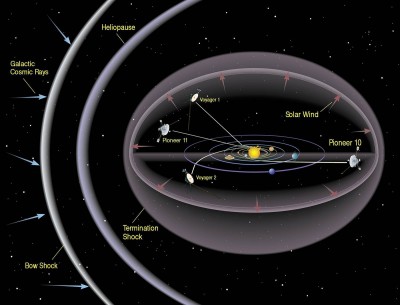
Researchers from Boston University and the University of Maryland published a study Thursday that offers an alternative view of the heliosphere, the area between the sun and outside the solar system, which could impact how scientists view the galaxy.
Merav Opher, one of the authors of the study and an astronomy professor in BU’s College of Arts and Sciences, and co-author James Drake of UMD propose in the study, published in Astrophysical Journal Letters, that the sun’s magnetic field can manipulate the shape of the heliosphere, according to a Thursday press release from BU.
“It was purely accident that we discovered it all,” Drake said. “We weren’t planning. We just assumed like everyone else that the heliosphere was a comet-like object … no one ever heard about jets in context of the heliosphere. All of the sudden, we are seeing these jet-like structures, so totally an accident, it just came out of the blue.”
Opher ran simulations on the heliosphere based on data from Voyager I space shuttle and discovered that the heliosphere is not shaped like a comet with a long tail, as was previously thought, but instead, it is split by two opposing jets, Drake said.
“If we are right about these jets being produced by the sun, then at least we have a form of the jet that we can actually study close by, and it will be a lot easier to figure out what’s going on,” he said.
Alan Marscher, director of the Institute for Astrophysical Research at BU and an astronomy professor in CAS, said these cosmic jets are unique in that they are caused by solar winds.
“The basic definition of a jet that we use in astrophysics is something that’s flowing, something with gas or particles that’s flowing in a given direction, and is quite narrowly focused,” he said.
John Clarke, a researcher for BU’s Center for Space Physics and an astronomy professor in CAS, said knowing the direction of the magnetic field in the outer heliosphere can help understand how cosmic rays enter our solar system and help in the future of long distance space travel.
“These kind of simulations are what we need right now. It could be tomorrow or it could be three years before any new information comes from the voyager spacecraft that tells us what’s going on,” he said.
Nancy Crooker, also an astronomy professor in CAS, said the study is groundbreaking for anyone researching the outer heliosphere.
It’s amazing and very exciting, because it’s so different,” she said. “Those who are not in agreement with this brand new picture will be forced to re-evaluate their own work and make sure it’s consistent with this new view.”
Drake said he and Opher are currently writing a follow-up to this research, which they expect to finish and archive in the next month or two. The new report will seek to show the sun’s magnetic field is in fact driving the jets and answering questions, such as the speed at which jets are traveling.
Several students said although most students aren’t personally involved in the research, knowing professors are actively contributing to the science community serves as motivation.
“Being a research university, BU puts out a lot of research, obviously, so it is inspiring to be taught by professors who do real world research,” said Craig Einstein, a junior in CAS. “It’s inspiring, and it is a driving force for me to research my own ideas.”
Gabe Gonzalez, a senior in CAS studying astronomy, said successful and groundbreaking research done by professors and students drives the program and community. Gonzalez helps with research about how solar flares affect the atmosphere of Mars.
“It says that we are a really research-oriented school because we have a ton of opportunities at least in astronomy, for students to do research, which is really good because it’s an experience that maybe at other schools, you wouldn’t be able to get,” he said. “If you’re able to put in the time to doing research, you get a lot out of it and it really is a great feeling you get out of doing research.”
Anthony Maue, a junior in CAS also studying astronomy, said he was not initially aware of the amount of research done at BU when he matriculated as a freshman.
“Coming to BU, I never thought I’d have the research opportunities I now have,” he said. “With just a little determination, you can be working on a NASA-funded project, which is awesome.”






















































































































